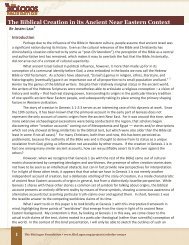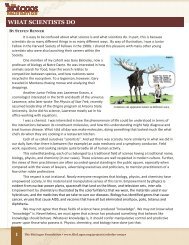Miracles and Science: The Long Shadow of David Hume - BioLogos
Miracles and Science: The Long Shadow of David Hume - BioLogos
Miracles and Science: The Long Shadow of David Hume - BioLogos
Create successful ePaper yourself
Turn your PDF publications into a flip-book with our unique Google optimized e-Paper software.
<strong>The</strong> <strong>BioLogos</strong> Foundation • www.<strong>BioLogos</strong>.org/projects/scholar-essays<br />
Witness testimony is <strong>of</strong>ten suspect.<br />
Stories get exaggerated in the retelling.<br />
<strong>Miracles</strong> are chiefly seen among ignorant <strong>and</strong> barbarous people.<br />
Rival religions also have miracle stories, so they cancel each other out.<br />
<strong>The</strong>se arguments are substantial, <strong>and</strong> I refer to footnote 3 for an introduction to the voluminous literature<br />
they have inspired. However, we can take a little stab at the first two objections. It is true that witness<br />
testimony cannot always be trusted <strong>and</strong> that stories change with time. But these are the same problems<br />
that face legal systems <strong>and</strong> historians. Nonetheless, we can employ the tools <strong>of</strong> these pr<strong>of</strong>essions to<br />
examine biblical miracles. Take, for example, the resurrection <strong>of</strong> Jesus Christ. <strong>The</strong>re is significant extrabiblical<br />
historical evidence that he indeed lived. Much has been written about the general trustworthiness<br />
<strong>of</strong> the Gospels. For example, there is much internal evidence, in both the style <strong>and</strong> content <strong>of</strong> the<br />
narratives, that the writers themselves were convinced that Jesus did indeed rise from the dead. Tradition<br />
holds that 11 <strong>of</strong> the 12 original apostles were martyred for this belief that turned a group <strong>of</strong> cowards into a<br />
people who “turned the world upside down.” Although it is well beyond the scope <strong>of</strong> this essay, a very<br />
strong case for the plausibility <strong>of</strong> the resurrection can be made. 27 Similar analysis can be brought to bear<br />
on other miracle claims, including those <strong>of</strong> other religions. After all, every meaningful system <strong>of</strong> thought<br />
must be open to careful scrutiny.<br />
But I suspect that <strong>of</strong>ten, underneath the surface, it is really the third argument that carries the most<br />
persuasive force. In part because history is littered with claims for the miraculous that seem bizarre, or<br />
smack <strong>of</strong> superstition, <strong>and</strong> in part because the incredible advances <strong>of</strong> modern science <strong>and</strong> technology<br />
inspire awe, we can intensely feel the attraction <strong>of</strong> identifying with the latter <strong>and</strong> not the former. This<br />
disposition is exemplified in the following quote by the theologian Rudolph Bultmann, a man famous for his<br />
attempts to de-mythologize the New Testament:<br />
It is impossible to use electric light <strong>and</strong> the wireless <strong>and</strong> to avail ourselves <strong>of</strong> modern medical <strong>and</strong><br />
surgical discoveries, <strong>and</strong> at the same time to believe in the New Testament world <strong>of</strong> spirits <strong>and</strong><br />
miracles. 28<br />
By getting rid <strong>of</strong> the miracle stories in the Bible, Bultmann <strong>and</strong> his followers hoped to make the Christian<br />
story more palatable to modern man. Although I recognize the emotional weight <strong>of</strong> this sentiment, I am<br />
not convinced that it is an intellectually coherent approach, mainly for reasons <strong>of</strong> self-consistency. If the<br />
New Testamentitself asserts, both directly <strong>and</strong> indirectly, that the historicity <strong>of</strong> the resurrection is<br />
foundational to Christianity, then it would seem to st<strong>and</strong> or fall by that fact. As a physicist, I have a natural<br />
penchant for wanting to see how an idea relates to more basic principles. And to analyze the validity <strong>of</strong> a<br />
quote like the one above, we must take a cold hard look at our fundamental presuppositions. In the words<br />
<strong>of</strong> John Polkinghorne:<br />
If we are to underst<strong>and</strong> the nature <strong>of</strong> reality, we have only two possible starting points: either the<br />
brute fact <strong>of</strong> the physical world or the brute fact <strong>of</strong> a divine will <strong>and</strong> purpose behind that physical<br />
world. 29<br />
9<br />
<strong>Miracles</strong> <strong>and</strong> <strong>Science</strong>:<br />
<strong>The</strong> <strong>Long</strong> <strong>Shadow</strong> <strong>of</strong> <strong>David</strong> <strong>Hume</strong><br />
BY ARD LOUIS




